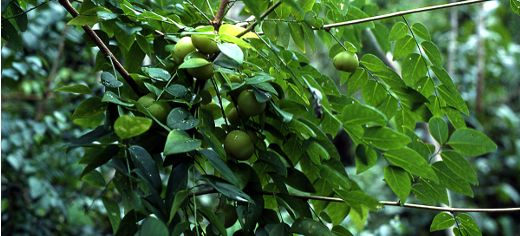
New University of Leeds research has shown why a bush that is only found in some African countries could hold a key to killing renal (kidney) cancer cells.
Phyllanthus engleri, also known as spurred phyllanthus, is only found in Tanzania, Zambia, Malawi, Zimbabwe and Mozambique.
Previous studies have shown that the plant contains a chemical, Englerin A, which kills renal cancer cells – but they have not shown why.
A research team led by Professor David Beech, of the School of Medicine at the University of Leeds, has discovered that Englerin A in very small amounts activates a particular protein, TRPC4, and its close relative TRPC5. This triggers changes in the renal cancer cell which kills it.
About 10,000 new cases of renal cancer are diagnosed each year in the UK. Half of those survive at least 10 years beyond diagnosis.
Professor Beech said: “This unexpected discovery is exciting because it means we could develop new cancer drugs towards these particular proteins, TRPC4 and TRPC5.
“Englerin A is particularly interesting because it is selective – it only kills renal cancer cells and a few other types of cancer cell. Other cell types are resistant to it, so we think Englerin A has a great deal of potential.
“This is just the first step on a journey though – our studies have been in the laboratory, not on patients. It could take some years to develop a drug which would effectively target these renal cancer cells in people.”
The research showed that the protein activated by Englerin A forms channels that open to allow tiny electrically-charged atoms known as ions to enter cells and trigger changes. This import of ions was studied at a molecular level.
Professor Beech’s team worked with colleagues at the Max Planck Institute of Molecular Physiology in Dortmund and Freie Universität in Berlin, Germany, on the research.
Co-author Professor Herbert Waldmann, Director at the Max Planck Institute, said: “Renal cancer is a devastating disease crying out for novel and innovative therapeutic approaches. The discovery of how Englerin A works and its protein target gives hope that new opportunities for treating this cancer can be found.
“Ion channels have hardly been explored in renal cancer and the enigmatic TRPC channels have not been considered in drug discovery for its treatment at all.
“Finding this truly novel and innovative target was only possible because we united the expertise of three groups bridging chemistry, chemical biology and biology.”
The research has been published in the chemistry journal Angewandte Chemie and was conducted in cell lines developed from cancer patients.
The research team will now work with the Dortmund-based Lead Discovery Center, which offers professional support in drug development, on the next stage of the project.
The Phyllanthus engleri is named after Professor Heinrich Gustav Adolf Engler (1844-1930), former Director of the Royal Botanical Gardens in Berlin, who initiated extensive botanical exploration in Africa. Some parts of the plant are used as food or in traditional therapies whereas other parts may be toxic.
A study in 2008, by Ratnayake et al. in the journal Organic Letters, was the first to discover that Englerin A selectively killed renal cancer cells.
Photo credit: Richard Spjut, World Botanical Associates, Bakersfield, California.
Further information
The research paper, “Englerin A is a potent and selective activator of TRPC4 and TRPC5 calcium channels”, by Akbulut et al., is available from the University of Leeds press office.
For a photograph of the Phyllanthus engleri or to interview members of the Leeds research team, contact the University of Leeds press office on +44 (0)113 343 4031 or email pressoffice@leeds.ac.uk
Professor Herbert Waldmann is available for interview. Contact Peter Herter, General Manager at the Max Planck Institute of Molecular Physiology, on +49 231 133 2500 or email peter.herter@mpi-dortmund.mpg.de